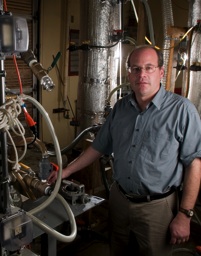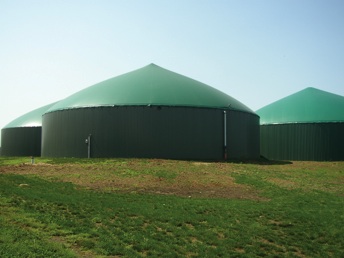
News
MSU leverages funds for farm waste-to-energy project
November 6, 2008 by Michigan State University
 November 4, 2008, East Lansing, MI
November 4, 2008, East Lansing, MI
– State and foundation grants exceeding $3 million will assist Michigan
State University researchers in developing technology for small farms
to turn animal waste into usable heat, electricity and other valuable
products.
November 4, 2008, East Lansing, MI – State and foundation grants exceeding $3 million will assist Michigan State University researchers in developing technology for small farms to turn animal waste into usable heat, electricity and other valuable products.
 |
| MSU researcher Steven Safferman with an anaerobic digester of the sort his team hopes to mate with power generators to produce power from animal waste. Image from MSU |
MSU’s planned Anaerobic Digestion Research and Education (ADRE) Center will consolidate new and existing programs in a 3,280-square-foot building south of the main campus, at MSU’s expanding farm animal and environmental research complex.
Researchers aim to develop and commercialize turnkey digester/microturbine modules for affordable waste-to-power systems for small and mid-sized farms.
“The initiating of the center completes our vision for a continuum of research capabilities from theoretical calculations to laboratory-scale, bench-scale, pilot-scale and farm-scale anaerobic digestion research,” said Steven Safferman, the center’s director and MAES biosystems and agricultural engineering scientist.
A two-year, $1.5 million Michigan Public Service Commission research grant “recognizes MSU’s strong capacity to address the critical issues of sustainability of animal agriculture and the need for renewable energy and economic development in Michigan,” said Ajit Srivastava, chairperson of the department of biosystems and agricultural engineering.
An additional three-year grant totaling $1.5 million from a private southeastern Michigan foundation to build the facility and fund new programs “is an excellent example of how universities and foundations can work together to address critical issues of society such as food, environment and energy,” Srivastava added.
The foundation prefers to remain anonymous.
 Farm waste management is a growing issue because of concerns over food contamination, pollutant runoff, odor and, most recently, greenhouse gas emissions. Petrochemical cost spikes, meanwhile, have added to farmers’ costs for fertilizer and fuel. The MSU ADRE Center will develop ways to efficiently convert manure liquids into methane for heat and electricity while extracting fiber for soil enrichment or ethanol manufacture and water for irrigation. Other valuable outputs could include animal feed and algae, which can be processed into biofuels.
Farm waste management is a growing issue because of concerns over food contamination, pollutant runoff, odor and, most recently, greenhouse gas emissions. Petrochemical cost spikes, meanwhile, have added to farmers’ costs for fertilizer and fuel. The MSU ADRE Center will develop ways to efficiently convert manure liquids into methane for heat and electricity while extracting fiber for soil enrichment or ethanol manufacture and water for irrigation. Other valuable outputs could include animal feed and algae, which can be processed into biofuels.
“The enhanced revenues and reduced pollution from the proposed system will significantly improve the quality of life and health of residents in rural communities and turn an environmental and economic liability into a public and private asset,” said project lead investigator Wei Liao, an assistant professor of biosystems and agricultural engineering. “It is our hope that success at this level will lead to extensive applications of similar technology throughout Michigan and the nation.”
The ADRE Center also is expected to conduct contract testing of related equipment and processes to help support itself, and to house a recently created farm energy auditing program that could conduct digester/power system feasibility studies for dairy clients. The center is slated for completion by mid- to late 2009.
The farm energy audit program is supported by a two-year, $250,000 grant, also from the private foundation. MSU will contribute another $230,000 toward the cost of managing and operating the ADRE Center.